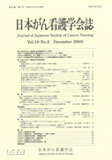Japanese
English
- 販売していません
- Abstract 文献概要
- 参考文献 Reference
要旨
本研究の目的は,告知を受けた乳がん患者が危機を乗り越え,がんとその治療に前向きに取り組み,自らQOLを高めて生の充実を図るための心理教育的看護介入プログラムを作成し,その効果を明らかにすることである.
プログラムは予備調査の結果と文献的考察を基に考案した.プログラムの内容は,病気や治療の適切な認知を促すこと,身体的,情緒的安定を促すこと,学習ニーズを充足することを構成要素とし,認知的,情緒的,教育的支援を用いて告知後1週間から退院後1カ月の期間に4回の個別介入をすることとした.
プログラムの効果は,65歳以下の初発乳がんで手術に臨む女性患者で研究の同意が得られた者を対象に,プログラムを適用した群(適用群)20人と,通常のケアを受けている群(非適用群)20人で比較検討した.両群ともに作成した身体症状質問票,日本版POMS,日本版MAC,QOL評価質問票を用いて介入前後で3回測定した.分析は,反復測定二元配置分散分析を用いた.
その結果,身体状態や情緒状態,がんへの取り組み,QOLにおいて両群間で有意差はみられなかった.しかし,病期別Ⅱ〜Ⅳ期グループの両群の比較では,抑うつ・落込み(p=0.022),前向きな態度(p=0.030)と絶望的な態度(p=0.077)において交互作用がみられ,適用群は非適用群に比べて介入前よりも介入直後および介入後1カ月で有意な改善または改善傾向が示された.よって,本プログラムは,Ⅱ期以上の乳がん患者の情緒状態,がんへの取り組みを有意に改善し効果があることが示唆された.
Abstract
The aim of this study was to develop and evaluate a psychoeducational nursing intervention program to help patients diagnosed to have breast cancer overcome the crisis, positively face the disease and its treatment, and improve their QOL through their own.
The subjects were those who consented to enrollment in the study among patients aged 65 years or below diagnosed to have breast cancer and scheduled to undergo surgery for the first time. The program consisted of : 1)promoting appropriate understanding of the disease and its treatment, 2)supporting their physical condition, 3) supporting their psychological state, and 4)fulfilling the needs for learning about the disease and treatment. This program was conducted in 4 sessions individually to each patient for about 2 months between 1 week after disclosure of the diagnosis and 1 month after discharge(intervention group ; 20 patients). Data were also collected from a group to which the program was not conducted(control group ; 20 patients)and the control group firstly were collected data. Each patient was evaluated before, immediately after and 1 month after intervention using the Japanese version of POMS, Japanese version of MAC, and a QOL questionnaire. The data were analyzed by two-way analysis of variance with repeated measurements in the two groups and by stratification of the subjects according to the disease stage and surgical procedure to evaluate the effect of the program.
The intervention group showed better improvements in the mood state, mental adjustment to cancer, and QOL than the control group until 1 month after intervention, but the differences between the two groups were not significant. In stages Ⅱ-Ⅳ, depression-dejection(p=0.022), fighting spiri(t p=0.03), and hopelessness / helplessness (p=0.077)were significantly better in the intervention group than in the control group until 1 month after intervention.
The results of this study suggested that the program produces significant improvement in the mood state and mental adjustment to cancer in stages Ⅱ-Ⅳ of patients with breast cancer.
Copyright © 2005, Japanese Society of Cancer Nursing All rights reserved.


